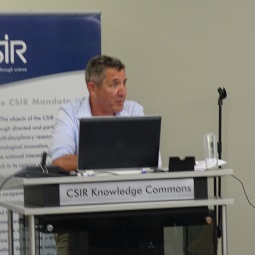1 000 students later: A celebration of 10 years of the Habitable Planet Workshop Series
“Through the Habitable Planet Workshops, I realised that there is a purpose out there for this young black girl from the deep rural farms of the Eastern Cape,” said Zanele Xelelo, a long-standing participant of the Applied Centre for Climate and Earth System Science’s (ACCESS) Habitable Planet Workshops. Xelelo spoke at the 10-year celebratory dinner of the Habitable Planet Workshop (HPW) series held at various locations across the country on 17 January 2018.
“Through the Habitable Planet Workshops, I realised that there is a purpose out there for this young black girl from the deep rural farms of the Eastern Cape,” said Zanele Xelelo, a long-standing participant of the Applied Centre for Climate and Earth System Science’s (ACCESS) Habitable Planet Workshops. Xelelo spoke at the 10-year celebratory dinner of the Habitable Planet Workshop (HPW) series held at various locations across the country on 17 January 2018.
HPW is an ACCESS initiative that seeks to address the paucity of science research students in South Africa. “The transformation of South Africa’s science community is key to ACCESS,” said ACCESS Director, Dr Neville Sweijd, “We provide opportunities to those who may not have otherwise received them, in order to further their careers.”
The HPW undergraduate programme comprises a series of 10-day student workshops which introduce third and fourth year students to the emerging discipline of the Earth System Sciences. The course is offered across southern Africa three times a year and has at its heart the concept of an African perspective on climate change. After a decade, HPW has engaged almost 1 000 students at more than 25 workshops.
“I never thought that ten days could change a person this much,” said Planeteer, Nomvula Mpungose. “I am a better person and a better scientist because of HPW.” HPW participants are fondly known as Planeteers since HPW emphasis the good that scientists can do to make the best out of the only habitable planet in the universe, Earth.
HPW is the brainchild of Dr George Philander (ocean-atmosphere specialist) and Dr Carl Palmer (atmospheric chemist). At the event, Philander reiterated the students’ testaments that HPW is more than pure academic learning. “We build self-confidence and self-esteem in the students and I have heard from a professor at Walter Sisulu University that HPW planeteers are easily identifiable in his class because they are the students who are not shy to ask questions,” he said.
CSIR Group Executive: Industrial Development, Dr Rachel Chikwamba applauded the HPW planeteers for embracing scientific challenges in a culture of diversity. “A cadre of young people have been trained to train others and we will start to see the fruits of this ripple effect.” ACCESS is a consortium of several agencies, research councils, research programmes, universities and research groups that have combined efforts to deliver a range of outputs aligned to the Department of Science and Technology Global Change Grand Challenge.
The keynote address was delivered by Department of Science and Technology (DST) Deputy-Director General, Dr Thomas Auf Der Hyde, who reaffirmed the commitment by DST to producing human capital in science that is meaningful in the South African context.
The event concluded with the presentation of the annual Dumisani Ndaba Memorial Award. HPW planeteer, Andisiwe Bango and Carl Palmer, ACCESS Education Portfolio Manager were joint winners.


